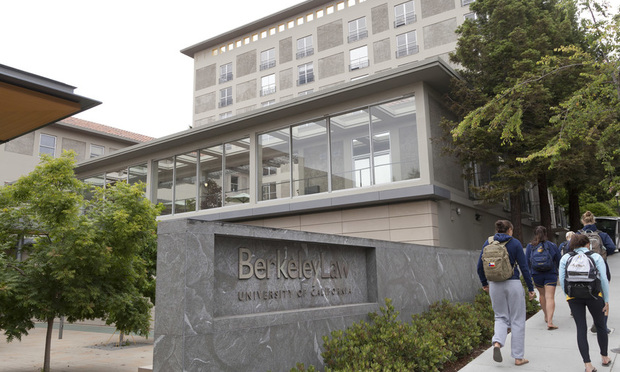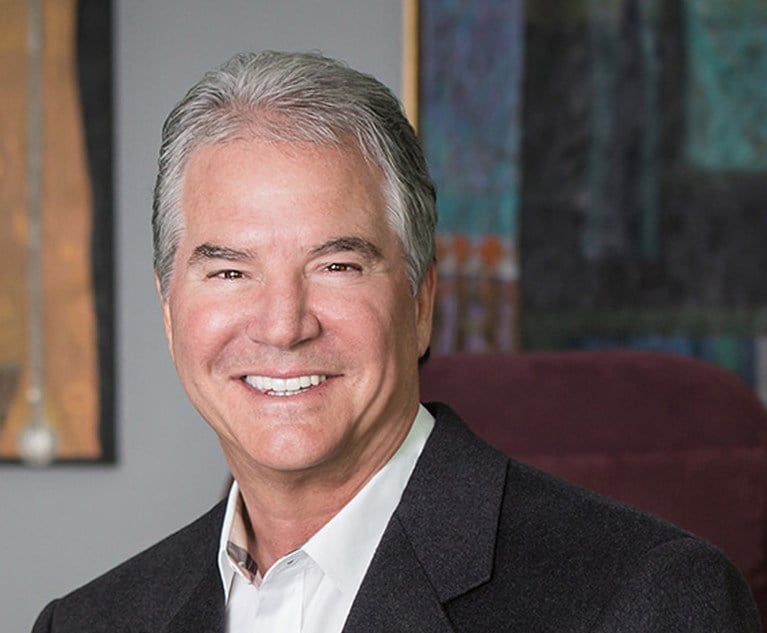UC Berkeley Law to Ditch Boalt Moniker Over Namesake's Racist Legacy
Berkeley Law Dean Erwin Chemerinsky on Tuesday announced his decision to remove the Boalt name from the law school's campus, after scholars unveiled the racist past of namesake John Boalt. The renaming has been a source of disagreement among students and alumni.
November 13, 2018 at 01:40 PM
6 minute read
 UC Berkeley School of Law campus.
UC Berkeley School of Law campus.
Boalt is out at the University of California, Berkeley School of Law.
Dean Erwin Chemerinsky announced Tuesday that he is recommending to the university the removal of the Boalt name from one of the law school's four buildings and that other references to John Henry Boalt be excised from campus.
Chemerinsky's decision follows months of public comment and study of Boalt and the Boalt relationship with the law school, after historians highlighted the school namesake's racist past. A law school committee in September issued a report to Chemerinsky on the renaming issue, which recommended doing away with references to Boalt, a 19th century California lawyer known for his leading role in the passage of the 1882 Chinese Exclusion Act. That legislation barred Chinese laborers from coming to the United States.
“Ultimately, the question is whether, based on all we know of a person, we should continue to honor the person by using his or her name,” Chemerinsky wrote in a message to the law school community announcing the decision. “I was especially moved by the views of many of our students and alumni of color who expressed discomfort in being part of a school where important aspects of its operation are named for someone who expressed such racism.”
Berkeley is just the latest law school to grapple with a racist namesake. In July, a panel at Florida State University recommended stripping the name of former Florida Supreme Court Justice B.K. Roberts from the Tallahassee school. Roberts resisted racial integration efforts from the bench throughout the 1950s. And Harvard Law School in 2016 decided to do away with its official seal because it featured elements of the family coat of arms of early donor and slaveholder Isaac Royall Jr.
The subject is an especially touchy one at Berkeley, which has been known colloquially as “Boalt Hall” for decades. Chemerinsky said he received more than 600 comments on the matter, with about 60 percent coming down in favor of changing the name. While Chemerinsky can unilaterally remove the Boalt name from law school clubs and lecturer positions, changing the name of the law school building requires the approval of the university chancellor.
It was not an easy decision to make, Chemerinsky wrote, saying that he had changed his mind several times during the weeks he considered the matter.
“I received passionate, persuasive messages on both sides of the issue,” he said in his message to students and alumni. “There was some correlation to when the writer graduated, but less than I expected.”
Some alumni from the 1950s, 1960s and 1970s were supportive of the name change, while some current students opposed it, he added.
The debate over Boalt's legacy and his continued place at the law school cropped up in 2017 when Berkeley lecturer and attorney Charles Reichmann wrote an op-ed in the San Francisco Chronicle highlighting Boalt's racist activities. Boalt never attended the Berkeley law school, and was most notable as an advocate for the Chinese Exclusion Act, which was the first federal law to bar immigrants based on their race. He gave a speech titled “The Chinese Question” in 1877 that argued the Chinese who had immigrated to California during the Gold Rush would never assimilate. Reichmann's research concluded that some 20,000 copies of the speech were distributed around the country.
Boalt's connection to the law school was forged through his widow, Elizabeth Josselyn Boalt. She donated money to construct a law school building in 1906 after his death. When the law school moved to a new campus in 1950, the building was named Boalt Hall. Many took to calling the school Boalt Hall and even referred to themselves as “Boalties.”
But Boalt Hall was never the law school's official name, Chemerinsky wrote in his letter, and alumni are still free to refer to the school that way. However, no law school buildings or entities will officially be known by the Boalt name. For example, the law student government is currently called the Boalt Hall Student Association.
Some proponents of the Boalt name argued that it should be modified to recognize Elizabeth Boalt and not her husband. Chemerinsky rejected that reasoning, saying that her donation was made in honor of John Boalt and that the Boalt name would still be prominent in that scenario. (The school will retain a portrait of Elizabeth Boalt and find other ways to honor her, Chemerinsky wrote.)
Others who objected to changing the name pointed to the fact that many other notable Americans, including George Washington, Thomas Jefferson, and Albert Einstein, owned slaves or held racist views. But those people made much larger contributions to the nation than did John Boalt, Chemerinsky reasoned, whose sole major accomplishment appears to be the Chinese Exclusion Act.
Reichmann said Tuesday that he is pleased with the decision, and credited the efforts of students and alumni to remove the Boalt name.
“Whether to keep the formal association between John Boalt and the Berkeley Law was never a simple question: It implicates competing values, and is not easy to answer,” Reichmann said. “In the end, though, I think the relevant question was whether the Berkeley Law School of the 21st century wishes to honor someone whose greatest public legacy was working to exclude Chinese people from the United States, and whose only legacy to the law school was his money.”
The Boalt name is already being phased out at the law school. Several lecture positions that bore the Boalt moniker have been renamed for former deans Jesse Choper, Herma Hill Kay, and Christopher Edley.
“I wish there could be a solution that pleased everyone,” Chemerinsky wrote. “In the end, I am reassured that we all are united in our desire to make this one of the finest law schools in the world.”
This content has been archived. It is available through our partners, LexisNexis® and Bloomberg Law.
To view this content, please continue to their sites.
Not a Lexis Subscriber?
Subscribe Now
Not a Bloomberg Law Subscriber?
Subscribe Now
NOT FOR REPRINT
© 2025 ALM Global, LLC, All Rights Reserved. Request academic re-use from www.copyright.com. All other uses, submit a request to [email protected]. For more information visit Asset & Logo Licensing.
You Might Like
View All
Assessing the Second Trump Presidency’s Impact on College Sports


LSAT Administrator Sues to Block AI Tutor From Using ‘Famous, Distinctive’ Test Prep Materials
3 minute readTrending Stories
- 1No Two Wildfires Alike: Lawyers Take Different Legal Strategies in California
- 2Poop-Themed Dog Toy OK as Parody, but Still Tarnished Jack Daniel’s Brand, Court Says
- 3Meet the New President of NY's Association of Trial Court Jurists
- 4Lawyers' Phones Are Ringing: What Should Employers Do If ICE Raids Their Business?
- 5Freshfields Hires Ex-SEC Corporate Finance Director in Silicon Valley
Who Got The Work
J. Brugh Lower of Gibbons has entered an appearance for industrial equipment supplier Devco Corporation in a pending trademark infringement lawsuit. The suit, accusing the defendant of selling knock-off Graco products, was filed Dec. 18 in New Jersey District Court by Rivkin Radler on behalf of Graco Inc. and Graco Minnesota. The case, assigned to U.S. District Judge Zahid N. Quraishi, is 3:24-cv-11294, Graco Inc. et al v. Devco Corporation.
Who Got The Work
Rebecca Maller-Stein and Kent A. Yalowitz of Arnold & Porter Kaye Scholer have entered their appearances for Hanaco Venture Capital and its executives, Lior Prosor and David Frankel, in a pending securities lawsuit. The action, filed on Dec. 24 in New York Southern District Court by Zell, Aron & Co. on behalf of Goldeneye Advisors, accuses the defendants of negligently and fraudulently managing the plaintiff's $1 million investment. The case, assigned to U.S. District Judge Vernon S. Broderick, is 1:24-cv-09918, Goldeneye Advisors, LLC v. Hanaco Venture Capital, Ltd. et al.
Who Got The Work
Attorneys from A&O Shearman has stepped in as defense counsel for Toronto-Dominion Bank and other defendants in a pending securities class action. The suit, filed Dec. 11 in New York Southern District Court by Bleichmar Fonti & Auld, accuses the defendants of concealing the bank's 'pervasive' deficiencies in regards to its compliance with the Bank Secrecy Act and the quality of its anti-money laundering controls. The case, assigned to U.S. District Judge Arun Subramanian, is 1:24-cv-09445, Gonzalez v. The Toronto-Dominion Bank et al.
Who Got The Work
Crown Castle International, a Pennsylvania company providing shared communications infrastructure, has turned to Luke D. Wolf of Gordon Rees Scully Mansukhani to fend off a pending breach-of-contract lawsuit. The court action, filed Nov. 25 in Michigan Eastern District Court by Hooper Hathaway PC on behalf of The Town Residences LLC, accuses Crown Castle of failing to transfer approximately $30,000 in utility payments from T-Mobile in breach of a roof-top lease and assignment agreement. The case, assigned to U.S. District Judge Susan K. Declercq, is 2:24-cv-13131, The Town Residences LLC v. T-Mobile US, Inc. et al.
Who Got The Work
Wilfred P. Coronato and Daniel M. Schwartz of McCarter & English have stepped in as defense counsel to Electrolux Home Products Inc. in a pending product liability lawsuit. The court action, filed Nov. 26 in New York Eastern District Court by Poulos Lopiccolo PC and Nagel Rice LLP on behalf of David Stern, alleges that the defendant's refrigerators’ drawers and shelving repeatedly break and fall apart within months after purchase. The case, assigned to U.S. District Judge Joan M. Azrack, is 2:24-cv-08204, Stern v. Electrolux Home Products, Inc.
Featured Firms
Law Offices of Gary Martin Hays & Associates, P.C.
(470) 294-1674
Law Offices of Mark E. Salomone
(857) 444-6468
Smith & Hassler
(713) 739-1250







